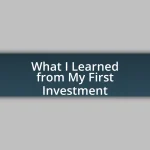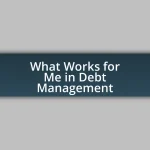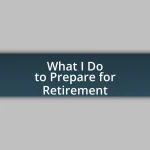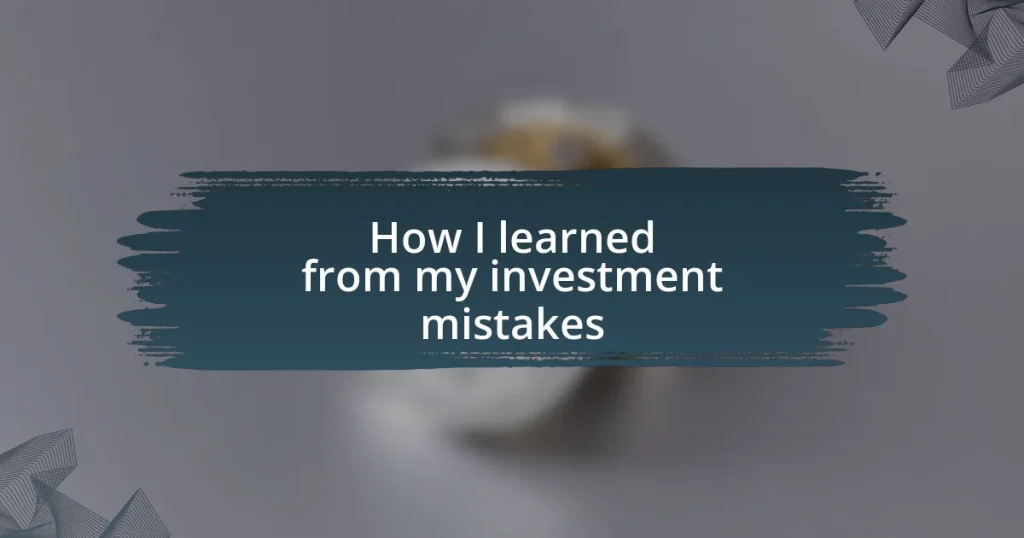Key takeaways:
- Investment mistakes often stem from emotional decision-making and psychological biases, highlighting the importance of data-driven choices.
- Common pitfalls include overconfidence, herd mentality, and lack of diversification, all of which can lead to significant losses.
- Reflecting on past errors and embracing a disciplined, strategic approach can foster resilience and improve investment outcomes.
- Continuous learning and setting clear financial goals are vital for successful investing and navigating market complexities.
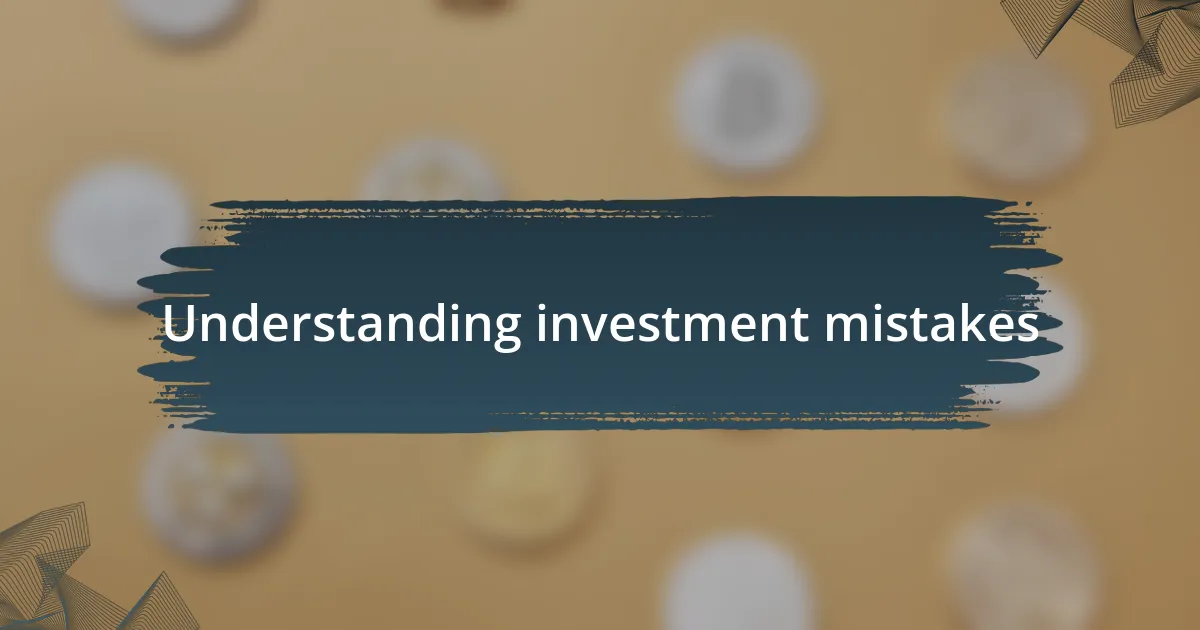
Understanding investment mistakes
Investment mistakes can feel like heavy weights pulling you down, can’t they? I still remember my first major blunder, where I chased a hot tip without doing my homework. The emotional rollercoaster—thrilling at first, then crushing when reality hit—taught me that hasty decisions often lead to regret.
Understanding why we make these mistakes is crucial for growth. I once held onto a declining stock way too long, convinced it would bounce back. I felt tethered to my emotions rather than the data, highlighting how our psychological biases can cloud our judgment. Have you ever felt that way, thinking if you just wait a little longer, everything will change?
Reflecting on these missteps reveals valuable lessons. Each error, although heart-wrenching at the time, carved out a path for deeper knowledge. They remind me that every investor encounters setbacks, and the key is to view them as stepping stones toward improvement. How do you view your own investment blunders? That perspective shift is a game-changer.
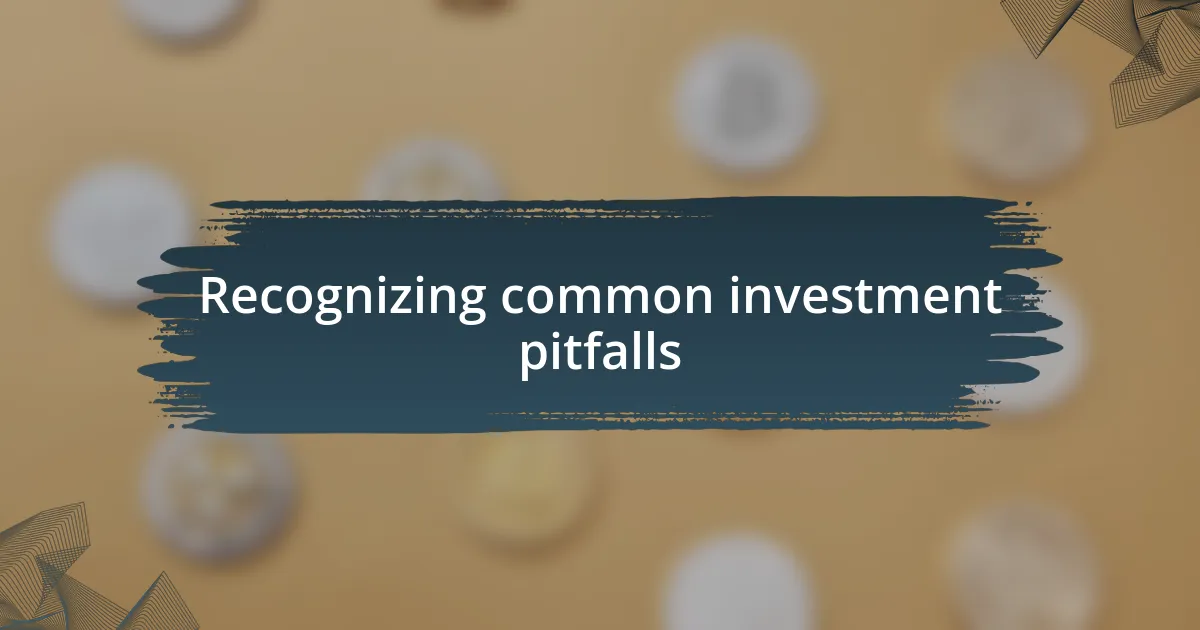
Recognizing common investment pitfalls
Recognizing common investment pitfalls is essential for anyone navigating the financial markets. One pitfall I’ve learned to avoid is overconfidence. Early in my investing journey, I believed I could predict market movements and dismissed the advice of more experienced investors. This hubris led me to invest heavily in a company without thorough research, ultimately resulting in significant losses. It’s a poignant reminder that confidence can easily tip into recklessness if not tempered with caution and diligence.
Another common issue is the tendency to follow the crowd. I once jumped into a trending stock because everyone around me was investing in it. Initially, it felt exhilarating, but when the stock took a nosedive, I realized I had acted out of fear of missing out, rather than making a rational decision based on analysis. It was a hard lesson in the importance of independent research and the perils of herd mentality.
Finally, I can’t overlook the mistake of neglecting to diversify my portfolio. Early on, I placed too much faith in a single stock that I was passionate about. When that company faced unexpected challenges, my entire investment took a hit. This experience highlighted the vital principle of diversification, which I now prioritize. Spreading investments across different sectors can significantly mitigate risk and provide stability during market fluctuations.
| Pitfall | Personal Experience |
|---|---|
| Overconfidence | Bets on unchecked predictions led to major losses. |
| Herd Mentality | Investing in a popular stock resulted in a steep decline. |
| Lack of Diversification | Heavy losses from focusing on a single stock. |
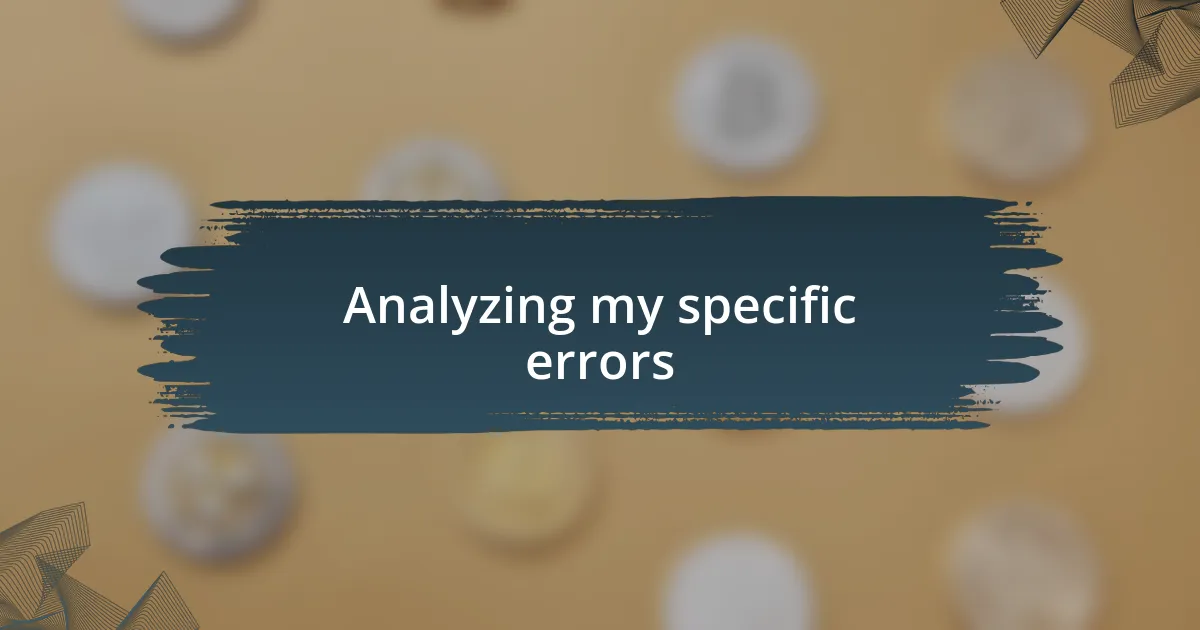
Analyzing my specific errors
I found that dissecting my specific errors has been instrumental in shaping my investing strategy. One grave mistake I made was setting unrealistic expectations. I remember when I invested in a start-up, expecting 100% returns within weeks. The thrill of fast profits clouded my judgment, leading to disappointment when reality didn’t align with my fantasies. This experience taught me that patience and realistic goal-setting are crucial for navigating the markets.
- Setting unrealistic expectations created a false sense of urgency.
- Ignoring the fundamentals led me to poor choices.
- Emotional trading resulted in impulsive buy and sell decisions.
Analyzing my fixation on short-term gains revealed a deeper issue: emotional decision-making. I used to react intensely to market fluctuations. One particularly volatile day, I sold my stocks in a panic, losing far more than if I had stuck to my strategy. This emotional roller-coaster underscored the importance of maintaining a level head and sticking to my long-term plan. Making decisions rooted in analysis, rather than emotion, has become a guiding principle for me.
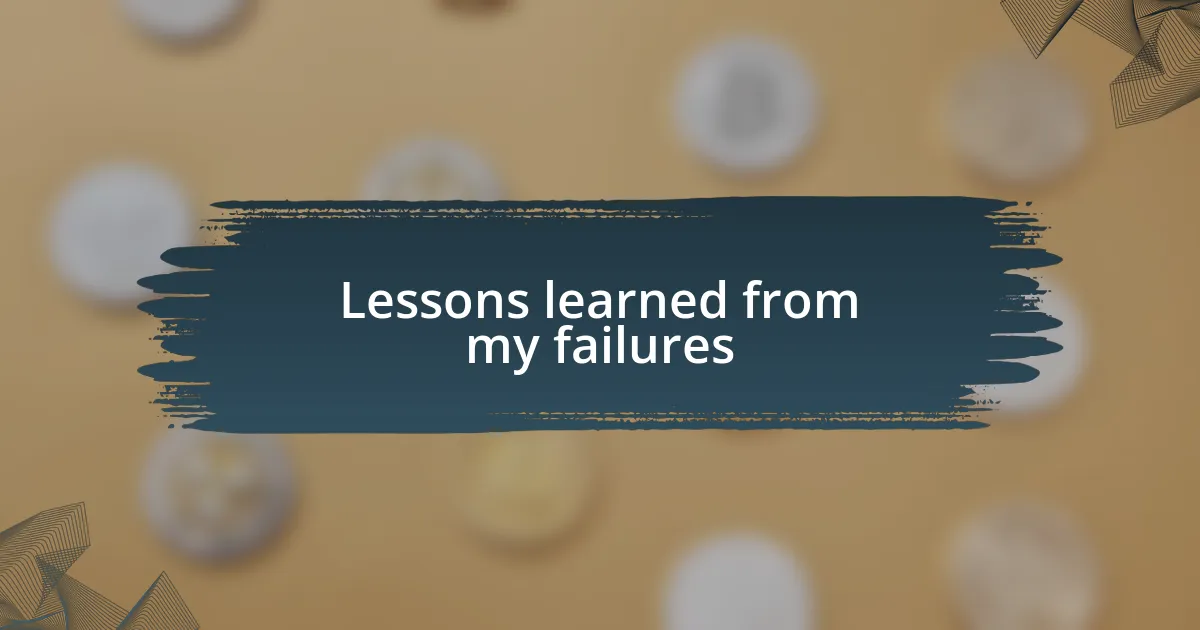
Lessons learned from my failures
Reflecting on my investment journey, I’ve learned that failure often carries the most profound lessons. I clearly remember a time when I jumped into a trendy stock based purely on hype. As the price plummeted, I felt a sting of regret that lingered much longer than the financial loss. That taught me the importance of research and understanding the underlying value of an investment; after all, a good story doesn’t always mean a good investment.
Another significant lesson emerged from my tendency to chase losses. I can still feel that sinking feeling when I doubled down on a failing investment, convinced that recovery was just around the corner. This relentless pursuit led to deeper holes and greater frustration. I realized that sometimes, the best decision is to cut your losses and move on, allowing space for better opportunities instead of clinging to past mistakes.
Adopting a more disciplined approach has been a game-changer for me. There was a phase when I tried to time the market, believing I could outsmart it. However, I learned the hard way that the market is unpredictable, and my attempts to control it often resulted in missed opportunities. Embracing a set investment strategy and sticking to it has brought a sense of calm to my trading experience, reinforcing the idea that discipline often trumps desperation.
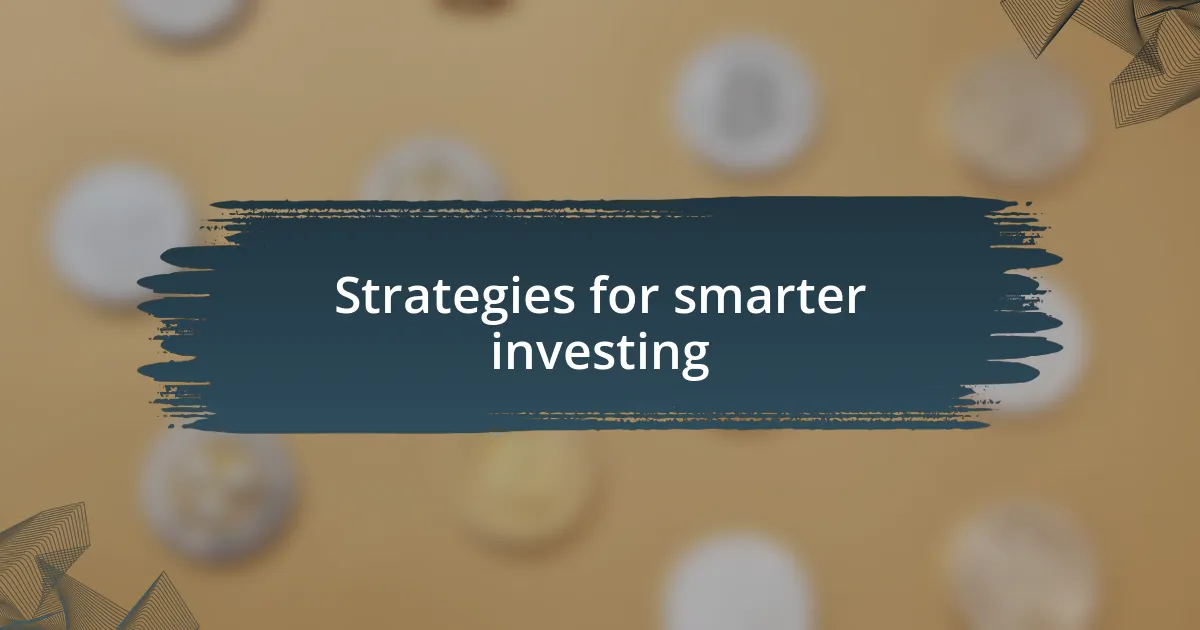
Strategies for smarter investing
When it comes to smarter investing, one strategy that has served me well is setting clear financial goals. Initially, I dove headfirst into investing without a defined purpose, which often led me to make impulsive decisions. Now, I take the time to map out my objectives, whether it’s saving for retirement or funding a dream vacation, and this clarity helps guide my investment choices, steering me away from distractions.
I’ve also found that diversification is a vital tool in my investment arsenal. Early on, I once allocated a hefty portion of my portfolio to a single tech stock that I thought was a surefire winner. When the stock unexpectedly faltered, the impact was devastating. Learning from that, I now spread my investments across different sectors and asset classes, which not only reduces risk but also cushions me against market volatility. Isn’t it reassuring to know that a well-diversified portfolio can provide some peace of mind during tumultuous times?
Lastly, I can’t stress enough the importance of continuous learning. In the past, I believed that once I had basic investing knowledge, I could sit back and let my money work for me. However, I’ve discovered that engaging with new materials—be it podcasts, books, or webinars—keeps me informed about market trends and investment strategies. This ongoing education not only strengthens my decision-making but also fuels my confidence in navigating the complexities of investing. Don’t you agree that keeping your knowledge fresh can significantly enhance your financial strategies?
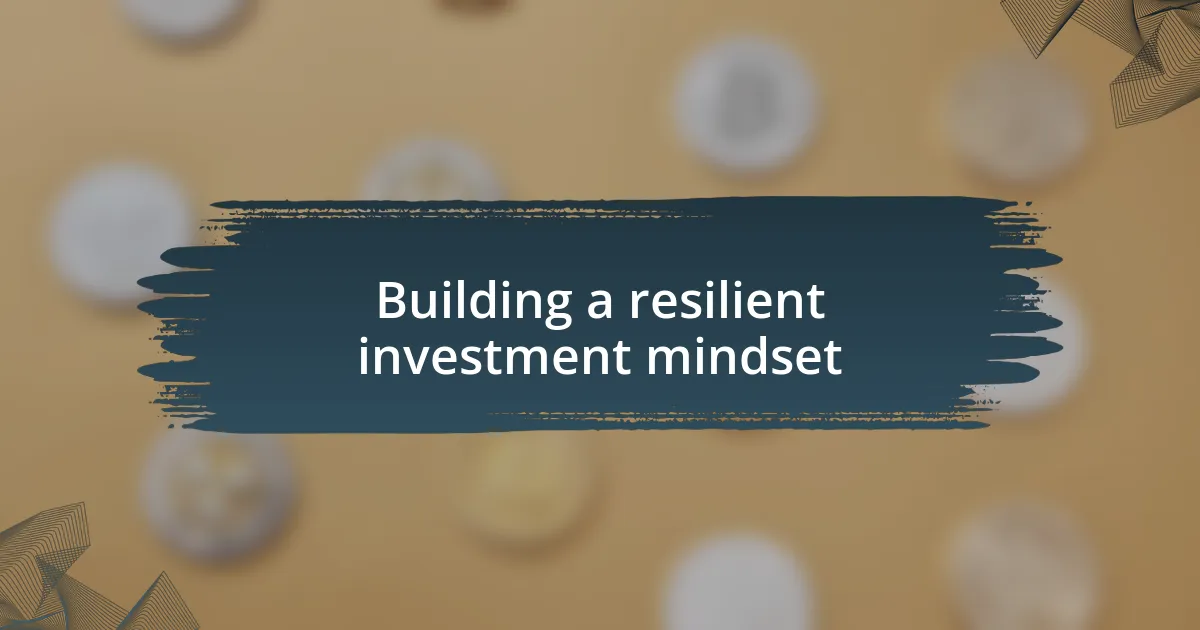
Building a resilient investment mindset
Building a resilient investment mindset is essential for weathering the ups and downs of the market. I recall a tough period when I let my emotions drive my decisions after a significant market dip. Instead of panicking and selling off my investments, I took a step back and reminded myself that market fluctuations are part of the investment journey. This mindset shift helped me focus on long-term growth rather than short-term anxieties.
Another aspect that has shaped my resilience is the practice of regular reflection on my investment choices. I remember a time when I impulsively followed a popular trend, leading to disappointment when the buzz wore off. Now, I dedicate time to assess my portfolio, analyzing what worked and what didn’t. This habit not only reinforces my commitment to my strategies but also strengthens my resolve against succumbing to fleeting market crazes. Have you ever taken the time to reflect on your decisions? It’s a game-changer.
Ultimately, having a supportive community can also fortify your investment mindset. In my early days, I often felt isolated in my investing journey. However, engaging with like-minded individuals—through forums or investment clubs—has allowed me to exchange ideas and gain different perspectives. Just discussing our challenges and successes has not only boosted my confidence but also reminded me that I’m not alone in this venture. Isn’t it comforting to know that others share the same struggles?





